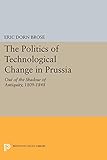The Politics of Technological Change in Prussia : Out of the Shadow of Antiquity, 1809-1848 / Eric Dorn Brose.
Material type: TextSeries: Princeton Legacy Library ; 141Publisher: Princeton, NJ : Princeton University Press, [2014]Copyright date: ©1993Edition: Course BookDescription: 1 online resource (306 p.)Content type:
TextSeries: Princeton Legacy Library ; 141Publisher: Princeton, NJ : Princeton University Press, [2014]Copyright date: ©1993Edition: Course BookDescription: 1 online resource (306 p.)Content type: - 9780691604787
- 9781400863068
- 943 20
- DD420
- online - DeGruyter
- Issued also in print.
| Item type | Current library | Call number | URL | Status | Notes | Barcode | |
|---|---|---|---|---|---|---|---|
 eBook
eBook
|
Biblioteca "Angelicum" Pont. Univ. S.Tommaso d'Aquino Nuvola online | online - DeGruyter (Browse shelf(Opens below)) | Online access | Not for loan (Accesso limitato) | Accesso per gli utenti autorizzati / Access for authorized users | (dgr)9781400863068 |
Frontmatter -- Contents -- Illustrations -- Acknowledgments -- Note on Proper Names -- Introduction -- I. Rural Industrialization and the Bourgeois King -- II. Liberal Brothers in Arms -- III. The Aesthetic View from Pegasus -- IV. The Spirit of the Corps -- V. Spartans of the North -- VI. The Masonic Vision -- VII. No Man's Hand Could Halt the Cars -- Conclusion -- Bibliography -- Index
restricted access online access with authorization star
http://purl.org/coar/access_right/c_16ec
Throughout the 1800s the process of industrialization contributed to painful social upheaval and wrenching political readjustments in the Kingdom of Prussia, traditionally viewed as Europe's great, modernizing, economic leader. This book illuminates the early years of this transition by examining the contradictory economic policies adopted by the state after Prussia's defeat by Napoleon. A fascinating history of modernization emerges as Eric Dorn Brose explores competing visions among soldiers, businessmen, and bureaucrats, who, largely influenced by the ideals of classical antiquity, conceived of industry in ways quite different from what it actually came to be. Brose focuses on the varying attitudes of Prussians toward their own times, the nature of the Prussian state, and the ways the state both helped and hindered early industrialization. In a highly nuanced analysis of the rivaling intrastate agencies, cultures, and political factions that shaped state policy, he accords a pivotal role to Frederick William III. Included is an investigation of the political struggle over ownership, control, and promotion of the forces of production--a crisis that was only gradually resolved at the end of the century.Originally published in 1993.The Princeton Legacy Library uses the latest print-on-demand technology to again make available previously out-of-print books from the distinguished backlist of Princeton University Press. These editions preserve the original texts of these important books while presenting them in durable paperback and hardcover editions. The goal of the Princeton Legacy Library is to vastly increase access to the rich scholarly heritage found in the thousands of books published by Princeton University Press since its founding in 1905.
Issued also in print.
Mode of access: Internet via World Wide Web.
In English.
Description based on online resource; title from PDF title page (publisher's Web site, viewed 30. Aug 2021)


